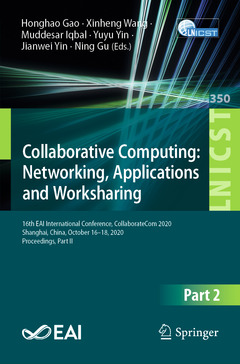Description
Collaborative Computing: Networking, Applications and Worksharing, 1st ed. 2021
16th EAI International Conference, CollaborateCom 2020, Shanghai, China, October 16–18, 2020, Proceedings, Part II
Lecture Notes of the Institute for Computer Sciences, Social Informatics and Telecommunications Engineering Series, Vol. 350
Coordinators: Gao Honghao, Wang Xinheng, Iqbal Muddesar, Yin Yuyu, Yin Jianwei, Gu Ning
Language: English
Subjects for Collaborative Computing: Networking, Applications and...:
Keywords
artificial intelligence; communication systems; computer hardware; computer networks; big data compressive; computer systems; data communication systems; databases; distributed computer systems; distributed systems; engineering; information processing; Internet of Things; network protocols; parallel processing systems; signal processing; telecommunication networks; wireless systems; telecommunication traffic; wireless telecommunication systems
578 p. · 15.5x23.5 cm · Paperback
Description
/li>Contents
/li>
The 61 full papers and 16 short papers presented were carefully reviewed and selected from 211 submissions. The papers reflect the conference sessions as follows: Collaborative Applications for Network and E-Commerce; Optimization for Collaborate System; Cloud and Edge Computing; Artificial Intelligence; AI Application and Optimization; Classification and Recommendation; Internet of Things; Collaborative Robotics and Autonomous Systems; Smart Transportation.




